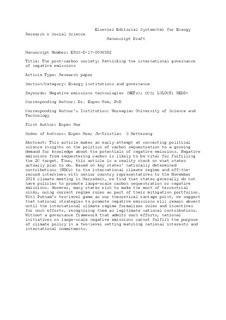| dc.contributor.author | Moe, Espen | |
| dc.contributor.author | Røttereng, Jo-Kristian Stræte | |
| dc.date.accessioned | 2019-01-31T08:37:01Z | |
| dc.date.available | 2019-01-31T08:37:01Z | |
| dc.date.created | 2018-06-05T15:03:06Z | |
| dc.date.issued | 2018 | |
| dc.identifier.citation | Energy Research & Social Science. 2018, 44 (October 2018), 199-208. | nb_NO |
| dc.identifier.issn | 2214-6296 | |
| dc.identifier.uri | http://hdl.handle.net/11250/2583251 | |
| dc.description.abstract | This article makes an early attempt at connecting political science insights on the politics of carbon sequestration to a growing demand for knowledge about the potentials of negative emissions. Negative emissions from sequestering carbon is likely to be vital for fulfilling the 2 °C target. Thus, this article is a reality check on what states actually plan to do. Based on key states’ nationally determined contributions (NDCs) to the international climate regime and off-the-record interviews with senior country representatives to the 2016 climate meeting in Marrakech, we find that states generally do not have policies to promote large-scale carbon sequestration or negative emissions. However, many states wish to make the most of terrestrial sinks, using current regime rules as part of their mitigation portfolios. We suggest that national strategies to promote negative emissions will remain absent until the international climate regime formalizes rules and incentives for such efforts, recognizing them as legitimate national contributions. Without a governance framework that admits such efforts, national initiatives on large-scale negative emissions cannot fulfill the purpose of climate policy in a two-level setting matching national interests and international commitments. | nb_NO |
| dc.language.iso | eng | nb_NO |
| dc.publisher | Elsevier | nb_NO |
| dc.rights | Attribution-NonCommercial-NoDerivatives 4.0 Internasjonal | * |
| dc.rights.uri | http://creativecommons.org/licenses/by-nc-nd/4.0/deed.no | * |
| dc.title | The post-carbon society: Rethinking the international governance of negative emissions | nb_NO |
| dc.title.alternative | The post-carbon society: Rethinking the international governance of negative emissions | nb_NO |
| dc.type | Journal article | nb_NO |
| dc.type | Peer reviewed | nb_NO |
| dc.description.version | acceptedVersion | nb_NO |
| dc.source.pagenumber | 199-208 | nb_NO |
| dc.source.volume | 44 | nb_NO |
| dc.source.journal | Energy Research & Social Science | nb_NO |
| dc.source.issue | October 2018 | nb_NO |
| dc.identifier.doi | 10.1016/j.erss.2018.04.031 | |
| dc.identifier.cristin | 1589163 | |
| dc.description.localcode | © 2018. This is the authors’ accepted and refereed manuscript to the article. Locked until 21.5.2020 due to copyright restrictions. This manuscript version is made available under the CC-BY-NC-ND 4.0 license http://creativecommons.org/licenses/by-nc-nd/4.0/ | nb_NO |
| cristin.unitcode | 194,67,25,0 | |
| cristin.unitname | Institutt for sosiologi og statsvitenskap | |
| cristin.ispublished | true | |
| cristin.fulltext | postprint | |
| cristin.qualitycode | 1 | |

